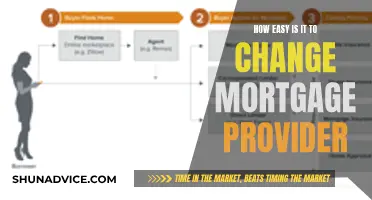
Early mortgage renewal is the process of renewing your current mortgage contract before it reaches maturity. Lenders are required by law to notify you 21 days before your term ends, but you can often renew 4–6 months in advance. Starting the renewal process early can give you more time to negotiate the best possible interest rate from multiple lenders. It can also help you lock in at current interest rates, protecting you against further rate fluctuations. However, renewing outside of a lender's particular renewal window could result in a prepayment penalty, so it's important to contact your lender to determine exactly how early you can renew.
| Characteristics | Values |
|---|---|
| Renewal process start time | 4-6 months before the end of the term |
| Renewal process deadline | End of the term |
| Renewal frequency | Multiple times |
| Renewal options | Online, in-person |
| Renewal incentives | Lower interest rate, change in loan type |
| Renewal window | Outside the window, a prepayment penalty may apply |
| Renewal statement | Must be provided by the lender at least 21 days before the end of the term |
| Renewal rate guarantee | 30-day guarantee |
What You'll Learn
- Lenders must notify you 21 days before your term ends, but you can renew 4-6 months early
- You can save money by renewing early and securing a lower interest rate
- You don't have to renew your mortgage with the same lender
- You can pay off your mortgage faster by shortening your amortization period
- Renewal is a good time to review your mortgage needs and make sure you have the right product

Lenders must notify you 21 days before your term ends, but you can renew 4-6 months early
When it comes to renewing your mortgage, you have options. You can renew your mortgage with your current lender, or you can move your mortgage to another lender. If you decide to stay with your current lender, you can renew your mortgage up to 4-6 months early. This means that if your mortgage term is five years, you can renew anytime between month 55 and month 60. By starting early, you give yourself ample time to explore your options and fully understand the mortgage you have or want. You can also take advantage of a promotional, lower interest rate. However, renewing outside of a lender's particular renewal window could result in a prepayment penalty, so be sure to contact your lender to determine exactly how early you can renew your mortgage.
Your lender is required by law to notify you 21 days before your term ends. If you don't take action, the renewal of your mortgage term may be automatic, and you may not get the best interest rate and conditions. If your lender plans on automatically renewing your mortgage, it will say so in the renewal statement. You may receive a mortgage renewal contract at the same time as a renewal statement. The renewal statement must specify that the interest rate offered won't increase until your renewal date.
If you decide to switch lenders, the new lender will need to approve your mortgage application and may use different criteria to determine your eligibility. You should start shopping around a few months before the end of your term and be sure to find out the costs of changing lenders, such as setup fees, discharge fees, and appraisal fees. You can also negotiate with your current lender, as you may qualify for a discounted interest rate that is lower than the rate quoted in your renewal letter.
Nationwide Title's Mortgage Note: Recreating the Details
You may want to see also

You can save money by renewing early and securing a lower interest rate
Renewing your mortgage early can help you secure a lower interest rate and save money. However, this depends on the rate being offered and whether it is lower than your current rate or the anticipated future rate. If you are concerned that interest rates will increase, locking in a low-interest rate early can help reduce the risk of a higher interest rate when your mortgage term is up.
Mortgage renewals are a necessary part of homeownership, and lenders will often contact you in advance with an offer to renew, which can reduce the odds of you shopping around. However, you are not required to renew your mortgage with the same lender. Exploring your options with different lenders can help you find the best mortgage product to save money and complete the necessary paperwork to switch lenders on your renewal date. A mortgage broker can assist you in this process by finding the best rates and negotiating on your behalf.
While renewing early can protect you from further rate fluctuations, it may also come with penalties for breaking your mortgage term early. This penalty is usually the interest for three months at your current rate or the interest rate differential calculated using the current rate, new rate, and remaining months on your mortgage term. Additionally, locking in a mortgage rate early may come at a cost, such as an extra 0.10 to 0.30 percentage points on your new locked-in interest rate.
To make an informed decision, it is important to consider the potential costs and benefits of renewing early. A mortgage penalty calculator can help determine how much you could save by switching to a lower rate or securing your current one. By starting the renewal process early, you can explore your options and make a decision that best suits your financial situation.
Understanding Rental Property Mortgage Debt on Your FAFSA
You may want to see also

You don't have to renew your mortgage with the same lender
When your mortgage term ends, you have to either pay off your mortgage in full or renew it. While you can choose to renew your mortgage with the same lender, you are not obligated to do so. You can move your mortgage to another lender if their conditions better suit your financial needs.
Start shopping around a few months before the end of your term. Contact various lenders and mortgage brokers to check if they offer mortgage options that better suit your needs. Don't wait until you receive the renewal letter from your lender. Negotiate with your current lender. You may qualify for a discounted interest rate that is lower than the rate quoted in your renewal letter. Tell your lender about offers you received from other financial institutions or mortgage brokers.
If you decide to switch your current mortgage to another lender for a loan of the same amount, the new lender will need to approve your mortgage application. The new lender may use different criteria than your original lender to decide if you qualify for a mortgage. Make sure you find out the costs of changing lenders, such as setup fees with the new lender, which may include discharge, registration, transfer and/or assignment fees from your current lender. You may also have to pay an appraisal fee to confirm the value of your property. Ask if your new mortgage lender is willing to pay for some or all of your costs to switch.
Renewing your mortgage is about more than agreeing to a new interest rate. It’s also an opportunity to make important decisions about the next phase of your mortgage, including payment frequency and amortization length. Preparing for a mortgage renewal ahead of time can take some of the stress out of these decisions. Generally speaking, you’ll want to start the mortgage renewal process sooner rather than later. This will give you more time to compare current mortgage rates among lenders, weigh options against your financial needs and negotiate the best mortgage contract for your next term. Some lenders suggest beginning the renewal process up to four months before your renewal date. You can also renew your mortgage up to six months early without incurring a prepayment penalty.
Mortgage Securitization: Benefits for Originators and the Market
You may want to see also

You can pay off your mortgage faster by shortening your amortization period
The amortization period is the length of time it takes to pay off a mortgage, including interest. The longer the amortization period, the lower your monthly payments will be, but the more you'll end up paying in interest over the life of your mortgage. Therefore, shortening your amortization period can help you pay off your mortgage faster.
To shorten your amortization period, you will have to refinance your mortgage with your current provider or a new one. Refinancing is like reapplying for a new mortgage with a new set of terms. However, it is not guaranteed that refinancing a mortgage will result in a shorter amortization period or lower interest rate. In some cases, refinancing may result in similar or higher interest rates, the same amortization period, and no changes to prepayment penalties.
If you can afford higher monthly payments, a shorter amortization period might be a better choice for you. You can increase your monthly payments by switching to an accelerated weekly or bi-weekly payment schedule. You can also make a lump-sum payment, depending on your mortgage. It is important to read through your mortgage contract terms to understand what you can do.
Another way to shorten your amortization period is to offer a larger down payment. This means you'll be borrowing less of a mortgage, making it easier to pay off, while also saving you thousands in interest.
Refinancing Your Mortgage: A Guide to Lowering Payments
You may want to see also

Renewal is a good time to review your mortgage needs and make sure you have the right product
You can start the renewal process up to six months before your current term ends. This gives you ample time to explore your options and decide on the best course of action for your current and future needs. You don't have to renew your mortgage with the same lender. You can move your mortgage to another lender if their conditions better suit your needs. It's a good idea to start shopping around a few months before the end of your term. Contact various lenders and mortgage brokers to check if they offer mortgage options that better suit your circumstances.
You can also negotiate with your current lender. You may qualify for a discounted interest rate that is lower than the rate quoted in your renewal letter. Tell your lender about offers you've received from other financial institutions or mortgage brokers. You can also use this time to pay off your mortgage faster. Advisors can help you compare different rates and terms to ensure you select the option that's right for you. You can also consider consolidating higher-interest debt through refinancing your mortgage to reduce interest costs.
When you renew your mortgage, you have the opportunity to make a change to your loan type. For instance, borrowers with a variable-rate mortgage may want to switch to a fixed-rate mortgage as part of an early renewal if rates are on the rise. You may also have the option to switch from a closed mortgage to an open mortgage, or vice versa.
Mortgage-Backed Securities: Boosting Economy Through Homeownership
You may want to see also
Frequently asked questions
Most lenders will allow you to renew 4 to 6 months before the end of your term.
Renewing your mortgage early can help you secure a lower interest rate and protect you against potential rate hikes. It also gives you ample time to explore your options and negotiate the best possible rate.
Renewing outside of a lender's particular renewal window could result in a prepayment penalty. It's important to contact your lender to determine exactly how early you can renew without incurring any fees.







